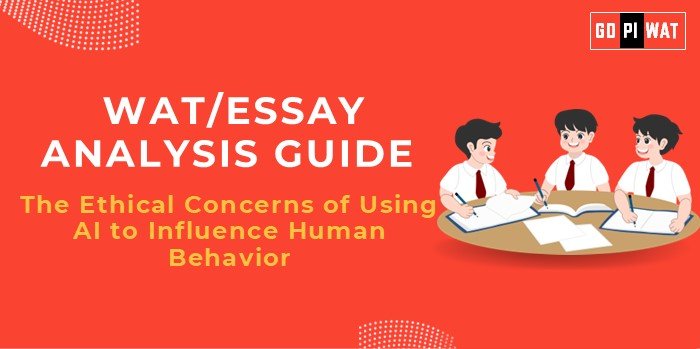📋 Written Ability Test (WAT) Analysis Guide
🤖 The Ethical Concerns of Using AI to Influence Human Behavior
🌟 Understanding the Topic’s Importance
AI-driven influence is a pivotal issue at the nexus of technology and ethics. Addressing it in B-school applications highlights a candidate’s understanding of societal impact and strategic thinking.
📝 Effective Planning and Writing
- Time Allocation:
- Planning: 5 minutes
- Writing: 20 minutes
- Reviewing: 5 minutes
- Preparation Tips: Collect facts on AI applications, ethical challenges, and regulations.
📖 Introduction Techniques for Essays
- Contrast Approach: “While AI has revolutionized personalization, its unchecked use raises concerns over autonomy and ethics.”
- Solution-Based: “Ethical AI deployment necessitates robust frameworks to balance innovation with integrity.”
- Timeline Approach: “From algorithmic advertising to social media trends, AI’s behavioral influence has grown exponentially.”
🔎 Structuring the Essay Body
Paragraph 1: Achievements
AI enhances personalization, improves efficiency, and predicts behavior effectively, transforming industries like marketing and healthcare.
Paragraph 2: Challenges
Ethical dilemmas include privacy invasion, algorithmic bias, and the potential for misuse in spreading misinformation.
Paragraph 3: Future Outlook
Solutions like ethical AI design, global standards, and stakeholder collaboration can mitigate risks.
📜 Concluding Effectively
- Balanced Conclusion: “AI’s potential is vast, but ethical deployment remains crucial to safeguarding trust and equity.”
- Global Comparison Conclusion: “Countries like the EU lead with GDPR, exemplifying the path toward ethical AI governance.”
✅ Analyzing Successes and Shortcomings
- Achievements: Enhanced decision-making, improved personalization, better analytics.
- Challenges: Data misuse, manipulation risks, and lack of transparency.
- Global Context: Ethical AI frameworks in Europe and Canada as benchmarks.
🌍 Recommendations for Sustainable Progress
- Regulatory Frameworks: Adopt AI governance policies.
- Stakeholder Collaboration: Involve tech companies, governments, and academia.
- Transparency Initiatives: Promote explainable AI systems.
🖊️ Sample Short Essays
- Balanced Perspective: “AI’s ability to predict human behavior transforms industries but raises ethical dilemmas around privacy and autonomy. Striking a balance through regulatory frameworks and accountability is imperative for sustainable progress.”
- Solution-Oriented: “By prioritizing ethical AI design and robust governance, we can harness AI’s potential without compromising individual autonomy or trust.”
- Global Comparison: “AI’s ethical challenges demand global solutions. Europe’s GDPR and UNESCO guidelines offer pathways for balancing innovation with ethical practices.”


